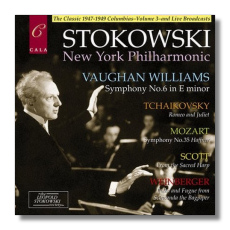
The Internet's Premier Classical Music Source
Related Links
- Latest Reviews
- More Reviews
-
By Composer
-
Collections
DVD & Blu-ray
Books
Concert Reviews
Articles/Interviews
Software
Audio
Search Amazon
Recommended Links
Site News
 CD Review
CD Review
Stokowski conducts the New York Philharmonic

- Ralph Vaughan Williams: Symphony #6
- Piotr Ilyitch Tchaikovsky: Roméo & Juliet
- Wolfgang Mozart: Symphony #35 "Haffner"
- Thomas Jefferson Scott: From the Sacred Harp
- Jaromír Weinberger: Polka & Fugue from Schwanda the Bagpiper
New York Philharmonic Orchestra/Leopold Stokowski
CALA CACD0537
The Leopold Stokowski Society has now completed issuing all of the recordings Stokowski made with the New York Philharmonic between 1947 and 1949. In addition they have added rare and valuable items from live performances. Now if I could just get them to issue the U.S. première of Prokofieff's 6th Symphony with that band. (Hint, hint, Ed.)
Listening to this over the past few evenings I wonder why I don't listen to it a lot more. It is one of the best pieces of music I know. The first movement, alone, is so full of ideas from the surreal that it fits perfectly as movie music for a film on Moby Dick. This music was thought to be about the war, which had just ended but Vaughan Williams denied this vehemently. It is, however, certainly about the human spirit in a deeply troubling way. The saxophones add to the feeling of the absurd in life and while there are moments of great beauty like the rolling of the sea, even then a troubled soul shadows the flow. This particular performance cannot be compared to any other for many reasons, most importantly because Stokowski uses the original Scherzo, later revised by the composer.
The Tchaikovsky sounds particularly good. There is a full, deep bass sound that is so important to The Stokowski Sound. At the same time there is inner detail and a sense of perspective. Of course it has Stokowski's amended ending but, as the notes point out, there is some evidence that this is how Tchaikovsky wanted it to end, softly and sadly, not with some MGM finale. Stokowski made four recordings of this piece and frankly I think this may be the best of them. The New York Philharmonic produce a really rich sound. The soloists can be clearly heard and are, of course, the best around at that time.
In many respects the Mozart might be considered the jewel in this crown. It is a shame that Stokowski didn't record more Mozart. His performance is light and dances. The sound, whilst not as good as from the studio recordings, is transparent and solo details are delightful. This is as good as anything Bruno Walter did with the New York Philharmonic. It is a warm performance that brings out the humor and humanity in Mozart's music.
The other lagniappes are more than just filler. They are both light and 'accessible' though 'modern' music. The piece by Tom Scott was issued on a V disc from the Department of the Army. The Weinberger is a lively piece and the applause at the end is really a fitting touch to the whole disc.
Post Script: Stokowski first conducted Roméo & Juliet in Cincinnati, Ohio in an all-Tchaikovsky program in December of 1911 less than 20 years after the composer's death. Stokowski was 11 when Tchaikovsky died. In a way you could consider all of this disc 'modern' composers for Stokowski.
Copyright © 2004, Robert Stumpf II



















